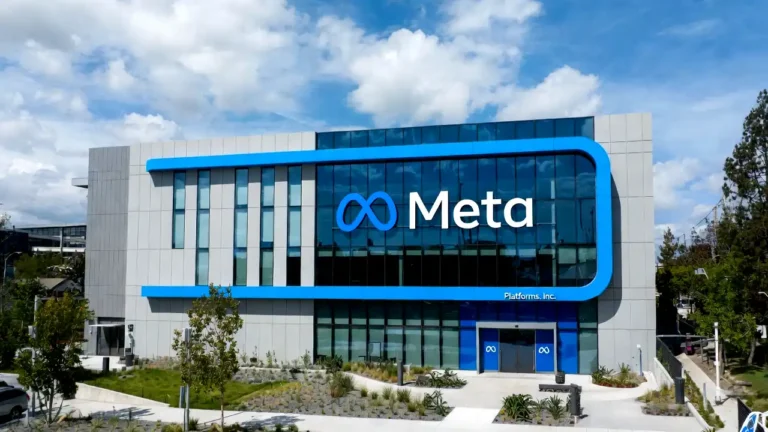Meta Platforms, Inc., formerly known as Facebook, Inc., is a global technology company that has played a pivotal role in shaping the digital landscape through its social media platforms and other technological ventures. Founded in 2004 by Mark Zuckerberg and his Harvard roommates, Meta has evolved from a simple social networking site into a leader in virtual reality (VR), augmented reality (AR), and the metaverse. This article details the key milestones in Meta’s journey, from its inception to its current focus on building immersive digital experiences.
| Founded | January 4, 2004 |
| Founders | Mark Zuckerberg, Eduardo Saverin, Andrew McCollum, Dustin Moskovitz, Chris Hughes |
| Type | Public Traded as-[Nasdaq: META] |
| Headquarters | Menlo Park, California, U.S. |
| Industry | Social media Social network advertising Consumer electronics Virtual reality |
| Subsidiaries | Novi Financial |
| Website | meta.com |
Founding and Early Growth (2004–2006)
Meta Platforms, Inc. began its journey in 2004 as Facebook, a social networking platform founded by Mark Zuckerberg, Eduardo Saverin, Andrew McCollum, Dustin Moskovitz, and Chris Hughes, all of whom were students at Harvard University. Initially created as an exclusive platform for Harvard students, Facebook’s popularity quickly spread to other Ivy League universities, and by the end of 2004, it had over one million users.
In 2005, Facebook received its first major investment from Peter Thiel, co-founder of PayPal, which helped the platform expand beyond college campuses to the general public. Facebook’s early growth was driven by its clean design, ease of use, and the introduction of features such as the News Feed in 2006, which revolutionized how users interacted with social content.
Global Expansion and Acquisitions (2007–2012)
By 2007, Facebook had established itself as one of the fastest-growing social networking platforms globally, boasting over 50 million active users. The company introduced Facebook Pages for businesses and public figures, marking the beginning of its commercialization.
In 2012, Facebook made headlines with its $1 billion acquisition of Instagram, a photo-sharing app that had gained popularity for its filters and visual storytelling capabilities. This acquisition proved to be one of Facebook’s most strategic moves, as Instagram would later become a cornerstone of Meta’s advertising business. Facebook also launched its initial public offering (IPO) in 2012, raising $16 billion, the largest technology IPO in history.
Mobile Dominance and WhatsApp Acquisition (2013–2014)
As smartphone adoption surged in the early 2010s, Facebook shifted its focus to mobile, redesigning its app and interface to cater to mobile-first users. In 2013, Facebook reported that most of its users were accessing the platform via mobile devices, highlighting the importance of mobile in its future strategy.
In 2014, Facebook made another significant acquisition, purchasing WhatsApp for $19 billion. WhatsApp, with its growing global user base and end-to-end encryption, was a key addition to Facebook’s expanding portfolio of apps. This acquisition strengthened Facebook’s position in the global messaging market and increased its user base, particularly in developing markets where WhatsApp was dominant.
Virtual Reality and the Oculus Acquisition (2014)
Also, in 2014, Facebook made a bold move into virtual reality by acquiring Oculus VR for $2 billion. Oculus pioneered virtual reality technology and is known for its Oculus Rift headset. This acquisition marked Facebook’s entry into the immersive technology space, with CEO Mark Zuckerberg expressing his vision for VR and AR as the next major computing platforms.
While VR took time to gain mainstream traction, the acquisition laid the foundation for Meta’s future focus on the metaverse. In this interconnected virtual world, users can interact in a 3D environment.
Data Privacy and Cambridge Analytica Scandal (2018)
Facebook’s rapid growth and influence came under scrutiny in 2018 when the Cambridge Analytica scandal erupted. It was revealed that the political consulting firm had harvested the personal data of millions of Facebook users without their consent and used it to influence political campaigns, including the 2016 U.S. presidential election.
The scandal sparked a global outcry over data privacy and led to multiple investigations by governments and regulatory bodies. Facebook faced fines, legal actions, and a loss of public trust. In response, Zuckerberg testified before Congress, and Facebook implemented new privacy policies and security measures to protect user data. However, the scandal permanently damaged the company’s reputation, highlighting the challenges of managing user privacy in the digital age.
Rebranding as Meta and the Metaverse Vision (2021)
In October 2021, Facebook, Inc. rebranded itself as Meta Platforms, Inc., signaling a strategic shift towards the metaverse. The rebrand was driven by Zuckerberg’s long-term vision of building an immersive virtual world where users could work, socialize, and play using technologies like VR and AR.
Meta’s focus on the metaverse was also evident in its development of Horizon Worlds, a social VR platform, and its continued investment in Oculus, which was rebranded as Meta Quest. The company committed to spending billions on developing metaverse technologies, positioning itself as a leader in this emerging space.
The rebrand to Meta also served as a way for the company to distance itself from the controversies surrounding Facebook, including issues related to misinformation, data privacy, and the spread of harmful content.
Financial Performance and Monetization Challenges (2022–2023)
Following the rebrand, Meta faced significant financial challenges. While the company remained profitable, its aggressive spending on metaverse development led to rising costs and a decline in profits. In 2022, Meta reported its first-ever revenue decline, raising concerns among investors about the company’s future profitability.
Despite these challenges, Meta continued to dominate the digital advertising market, with Facebook, Instagram, and WhatsApp serving as key platforms for advertisers. The company also invested in new monetization strategies, including e-commerce features on Instagram and WhatsApp, as well as subscription services for creators on its platforms.
Regulatory Scrutiny and Antitrust Concerns (2020–2023)
Due to its market dominance and data practices, Meta has faced increasing scrutiny from regulators worldwide. In 2020, the U.S. Federal Trade Commission (FTC) and multiple states filed antitrust lawsuits against Meta, accusing the company of engaging in anti-competitive behavior by acquiring Instagram and WhatsApp to eliminate potential rivals.
Meta also faced regulatory challenges in Europe, where the European Union introduced stricter data privacy laws, such as the General Data Protection Regulation (GDPR). The company has been fined multiple times for privacy violations, and its handling of user data remains a point of contention.
The Role of AI in Meta’s Future (2023–Present)
In 2023, Meta made significant strides in artificial intelligence (AI), which has become a central part of its platform development. AI plays a critical role in content moderation, personalized recommendations, and advertising algorithms. Meta has invested in AI research, particularly in natural language processing and machine learning, to enhance user experience and improve its ad targeting capabilities.
Meta also introduced AI-driven tools for businesses, including AI-powered chatbots for customer service and AI-generated content for marketing. These innovations demonstrate the company’s commitment to leveraging AI to drive growth and efficiency.
The Future of Meta: Building the Metaverse and Beyond (2023–Present)
As of 2023, Meta Platforms, Inc. is focused on building the metaverse and creating the infrastructure for immersive digital experiences. The company envisions a future where the metaverse becomes a central part of everyday life, with users interacting in virtual spaces for work, entertainment, and socialization.
Meta continues to invest in VR and AR technologies, developing new hardware, such as the Meta Quest 3 headset, and exploring partnerships to expand the metaverse ecosystem. Additionally, Meta is exploring how AI and blockchain technologies can enhance the metaverse, creating new opportunities for digital ownership, commerce, and innovation.
Despite facing challenges related to financial performance, regulatory scrutiny, and competition from other tech giants, Meta remains committed to its vision of a connected digital world. As the company navigates these challenges, its role in shaping the future of social media, immersive technology, and the metaverse will be closely watched.
Meta Platforms, Inc. has come a long way since its early days as Facebook, transforming into a global leader in technology and innovation. With its bold vision for the metaverse, Meta is poised to redefine how people interact with technology and one another in the years to come.





